Tying Narrative Threads by Opening Closet Doors: Coming Out on Ugly Betty
Melanie Kohnen / Georgia Institute of Technology
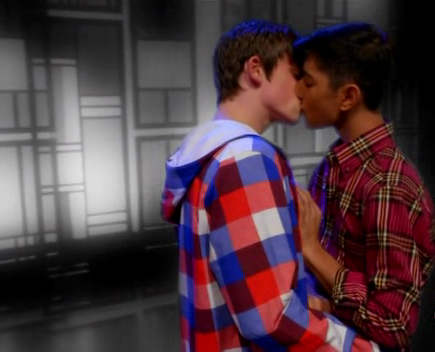
In my previous column, I explored the impact of FlashForward‘s cancellation on our understanding of the series’ depiction of queerness and race. In this column, I turn to another type of narrative closure typical of television, namely the ending of a long-running series, and investigate what potential it offers for representing queerness and race. Ugly Betty ended its four-season run on ABC in April 2010. Due to plenty of advance notice, the series had the opportunity (and imperative) to wrap up its major storylines during its final season (in contrast to FlashForward‘s late cancellation, which made it impossible to wrap up storylines).1 The coming-out storyline constructed around teenager Justin Suarez in the final episodes of Ugly Betty is particularly interesting in terms of closure, queerness and race. By finally confirming that Justin is indeed interested in boys, Ugly Betty resolved one of its most long-standing narrative mysteries.
Would Justin have had this coming-out storyline if Ugly Betty hadn’t been canceled? Probably not. Settling the question of his sexual identity functions as part of the narrative closure brought about by the impending end of the series. Justin’s coming out fits well into the pattern of closure that winds through Ugly Betty‘s final season as many of the resolved story arcs deal with romantic relationships. In Justin’s case, the final episodes of Ugly Betty depict Justin falling for Austin, whom he meets in his acting class. After a brief period in which both appear in denial of their feelings for one another, they begin dating and Justin comes out to his family. For the long-time viewer, this storyline finally confirms that yes, the fact that Justin loves fashion and musical theater does mean that he is gay.
The significance of Justin’s coming out oscillates between posing a challenge to the typical “Hollywood ending” of heterosexual romance and falling in line with the demands of post-closet (and post-racial) television. On the one hand, Justin’s developing relationship with fellow theater geek Austin goes against heterosexual closure: Justin ends up with a boy, not a girl (how far outside of heteronormativity this storyline falls is another question, of course). On the other hand, it confirms the impression that, according to Ron Becker, “all men on [post-closet TV] who are gay are out, and any man who isn’t out is obviously (and securely) straight—otherwise they’d be out.”2 In the final days of Ugly Betty, there is no room for Justin’s previously ambiguous queer identity.
Justin’s coming-out storyline features many of the tropes that we have come to expect of such a scenario: confusion, failed heterosexual romance and worry about the reaction of family and friends. What is unusual, however, is the presence of openly gay Marc St. James in Justin’s life. Over the course of the series, Marc, who works at the same fashion magazine as Justin’s sister Betty, becomes a mentor to Justin. Marc’s presence allows Ugly Betty to narrate a critique of coming-out tropes even though the series ultimately does not challenge post-closet TV’s imperative to be out.
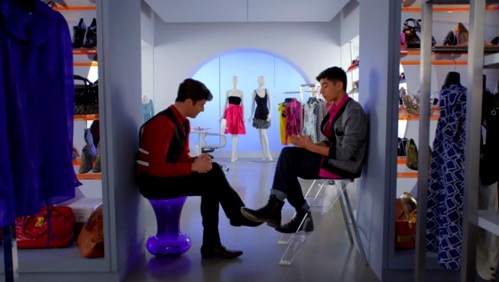
For example, Justin seeks out Marc’s advice after Bobby, Justin’s soon-to-be stepfather, catches Justin and Austin kissing outside the Suarez home. It is perhaps not entirely coincidental that this conversation takes place in Mode magazine’s fashion closet. Worried that Bobby will reveal his secret, Justin asks, “Why does anyone have to know?” to which Marc replies, “If you don’t want anyone to know, they don’t have to know.” Unfortunately, contemporary television voids Marc’s reassurance that Justin doesn’t have to announce his relationship with Austin. The logic of post-closet TV merges with the demand for narrative closure as both require that Justin’s sexual identity be declared in a way that doesn’t leave room for doubt.
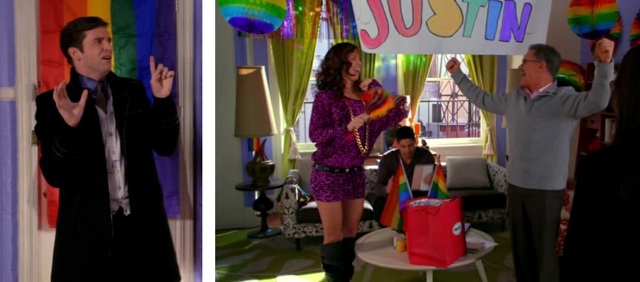
The barely prevented coming-out party for Justin.
Not surprisingly, then, the Suarez family finds out about Justin’s newly embraced sexual identity even without the obligatory “I’m gay” from Justin (rather, Bobby caves to the persistence of Hilda, Justin’s mother and Bobby’s future wife). Eager to demonstrate their acceptance of Justin, the family decides to throw a surprise coming-out party replete with rainbow streamers and PFLAG brochures. Once again it is Marc who intervenes and calls attention to the problematic nature of the planned party. Marc explains that “it’s not about you being fine with it, it’s about Justin being fine with it.” Marc’s intervention calls attention to television’s tendency to shift the emphasis of queer storylines away from queer characters to their (straight) families.3 But once again, it is only the circumstances of coming out that are being called into question, not the act of coming out in itself. After all, Marc ends his party-stopping intervention by explaining that Justin will come out in his own time. While Ugly Betty actually narrates the pressure surrounding the decision of when and how to come out, the narrative doesn’t question that Justin’s coming out will (or should) happen.
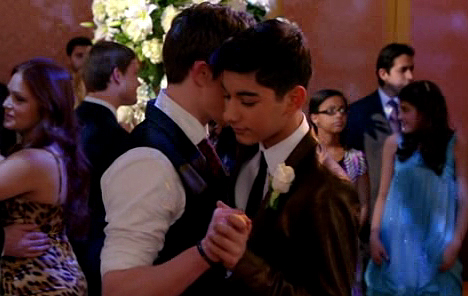
In the end, Justin does not verbalize his coming out, but rather reaffirms what his family and friends know by dancing with Austin at Hilda’s wedding. Coming out via a gesture opens up contradictory possibilities. It implies a level of equality that didn’t exist previously; Justin and Austin are just like any of the other couples dancing at Hilda’s wedding. The only people who take note of them are Justin’s family, who give Justin and Austin approving glances. This scene suggests that TV has moved past dramatic coming out scenes with emphatic declarations of “I’m gay;” instead, a gesture suffices. But this gesture still needs to be clear enough to signal “I’m gay.”
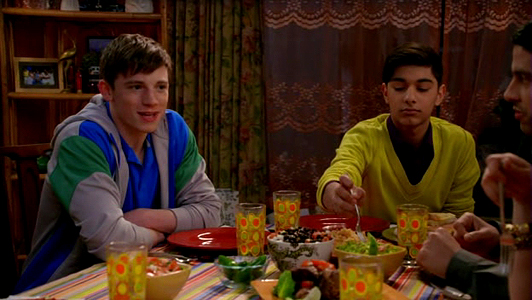
While Ugly Betty demonstrates some self-reflexivity regarding televisual coming-out tropes, it has a large blind spot regarding the interracial aspect of Justin and Austin’s relationship. The only remark about Austin’s whiteness appears in the series’ final episode, when, during a family dinner, Austin observes that he is glad to become “a part of this Latin family” to which Hilda replies, “We’re gonna spice you up so much you’re gonna forget you’re white!” Perhaps it is not strictly necessary for Ugly Betty to address the interracial nature of Justin and Austin’s relationship. The differences in their cultural backgrounds don’t seem to be on Justin and Austin’s minds—they are busy enough processing the idea that their sexual identity might fall outside the norm. Moreover, Ugly Betty projects the (too) comforting notion that Justin and Austin are part of a post-racial generation for which racial difference isn’t important anymore.4
Yet, the idea that race and sexuality, especially queer sexuality, are separate matters is one that has circulated in American culture for a long time and has turned attention away from interrogating how entwined discourses of race and sexuality are.5 Austin’s brief remark about being included in a “Latin” family and Hilda’s response about making Austin forget that he’s white seem like throwaway lines. But I think they reveal the labor involved in a post-racial outlook on TV and beyond. Racial or cultural differences might not be openly addressed, but they don’t go unnoticed (Austin’s awareness of the Suarez as a “Latin” family) and they need to be actively forgotten. This contradictory process recalls Justin’s coming-out storyline: a dramatic declaration of “I’m gay” seems unnecessary, but a definite confirmation of his gay identity still concludes his character’s final narrative arc. Instead of seeing these as mere parallels, I argue that the “forgetting” of Austin’s whiteness constitutes a moment in which a post-closet outlook merges with a post-racial perspective. Accordingly, both society and televisual representations have supposedly progressed far enough that racial and sexual difference doesn’t make a difference anymore. But this glossing over of difference crucially depends on a precise identification on which side of the dividing line between gay/straight and white/not white one falls.
The narrative closure brought about by the ending of Ugly Betty intensifies the need for clarity regarding characters’ identities and romantic relationships. It appears as if, at least in Justin and Austin’s case, the volatile relationship of race and queer sexuality has found an equilibrium, thus echoing the discourses of post-closet and post-racial television. While FlashForward‘s abrupt ending left the viewer unsettled and thus possibly encouraged to imagine and re-imagine characters’ storylines, Ugly Betty‘s numerous moments of closure reassure the viewer that everyone has found their rightful place.
Image Credits:
1. Justin and Austin’s first kiss. Author screen grab.
2. Marc and Justin talk about how Justin should come out to his family. Author screen grab.
3. The barely prevented coming-out party for Justin. Author screen grab.
4. Justin and Austin dance at Hilda’s wedding. Author screen grab.
5. Austin has dinner with Justin’s family. Author screen grab.
Please feel free to comment.
- The Futon Critic reported Ugly Betty‘s cancellation on January 27, 2010. See http://thefutoncritic.com/news/2010/01/27/abc-cancels-ugly-betty/8497/ [↩]
- Ron Becker, Post-Closet Television. Flow, November 2007. [↩]
- See, for example, the made-for-TV movies An Early Frost (1985) and The Matthew Shepard Story (2002). [↩]
- For more on post-racial TV, see Mary Beltran’s recent What’s at Stake in Claims of “Post-Racial” Media?. Flow, June 2010. [↩]
- For an overview of this history, see Siobhan B. Somerville’s Queering the Color Line: Race and the Invention of American Culture. Durham, NC: Duke University Press, 2000. [↩]
Hi Melanie, thanks for this interesting analysis of coming-out on Ugly Betty. I really like how you called attention to the fact that television has privileged the stories of the straight families of gay characters, rather than the complexity of the coming out process for gay characters themselves. Your argument that Ugly Betty had to confirm Justin’s sexuality before the show ended raises important questions about why we still need to confirm one’s sexuality (or…race, gender, etc) and how this process functions as necessary in order for post-closet (post-race, post-feminism too) television discourses to be accepted and embraced by the viewers.